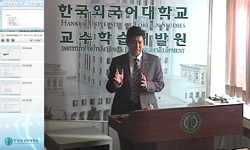지금까지 여러 연구들이 국제비교지수의 메커니즘에 주목했으나 여전히 지수들이 어떻게 국가의 행동을 변화시킬 수 있는지 알지 못하는 부분이 많다. 특히, 대부분이 국내정치적 과정을 ...
http://chineseinput.net/에서 pinyin(병음)방식으로 중국어를 변환할 수 있습니다.
변환된 중국어를 복사하여 사용하시면 됩니다.
- 中文 을 입력하시려면 zhongwen을 입력하시고 space를누르시면됩니다.
- 北京 을 입력하시려면 beijing을 입력하시고 space를 누르시면 됩니다.
국제비교지수와 규범준수: 국제비교지수는 어떻게 국제규범에 대한 대중의 인식을 변화시키는가? = GPI and Norm Compliance: How Does GPI Change Public's Perception of International Norm?
한글로보기https://www.riss.kr/link?id=T16865111
- 저자
-
발행사항
서울 : 서울대학교 대학원, 2023
-
학위논문사항
학위논문(석사) -- 서울대학교 대학원 , 정치외교학부(외교학전공) , 2023. 8
-
발행연도
2023
-
작성언어
한국어
- 주제어
-
DDC
327
-
발행국(도시)
서울
-
형태사항
vi, 110 ; 26 cm
-
일반주기명
지도교수: 박종희
-
UCI식별코드
I804:11032-000000178326
- DOI식별코드
- 소장기관
-
0
상세조회 -
0
다운로드
부가정보
국문 초록 (Abstract)
실험 결과 대중들에게 가장 핵심이 되는 비교의 기준은 국가 전체인 것으로 나타났다. 국가 전체와 비교하여 상위권을 기록했을 때와 하위권을 기록했을 때 모두 대중들이 정책적 상황의 심각성을 인식하는 정도가 변화하였다. 하지만, 동료 집단과의 비교는 기후변화 이슈에 한정하여 자국이 더 좋은 성적을 기록하였을 때만 사람들의 인식을 변화시켰다. 마지막으로 사람들은 자국의 목표나 라이벌 국가를 핵심적인 비교의 기준으로 삼지 않았다. 두 비교의 기준점은 모든 이슈에 걸쳐 효과가 없는 것으로 나타났다.
본 연구의 함의는 다음과 같다. 첫째, 국제비교지수가 가지는 잠재력은 시각적 직관에 있으며, 이는 어떤 세세한 비교보다 훨씬 더 큰 효과를 일으킨다. 둘째, 그럼에도 국제비교지수는 이미 어느 정도 규범을 준수하고 있는 국가의 대중들을 자극하거나, 전반적인 준수 수준이 낮은 규범에 대해 국내적 압력을 일으키기에는 역부족일 수 있다. 셋째, 대중들 또한 국제비교지수에 의해서 인식이 바뀔 수 있는 ‘관객’이며, 이는 실천적 측면에서 GPI를 발표하는 기관들에 또 다른 가능성을 열어준다.
지금까지 여러 연구들이 국제비교지수의 메커니즘에 주목했으나 여전히 지수들이 어떻게 국가의 행동을 변화시킬 수 있는지 알지 못하는 부분이 많다. 특히, 대부분이 국내정치적 과정을 일종의 ‘블랙박스’로 취급함에 따라 일반 대중은 거의 주목받지 못했다. 본 논문은 설문 실험을 통해 국제비교지수가 어떻게 대중의 인식을 변화시킬 수 있는지 확인하다. 대중들이 국제비교지수를 해석함에 있어 핵심적 기준이 될 수 있는 네 가지 비교의 준거점에 주목한다. 첫째, 대중들은 자국의 이상적인 모습과의 괴리로 정책적 상황을 평가할 수 있다(거울 효과). 둘째, 대중들은 특정한 한 두 국가만을 비교의 기준점으로 삼아 정책적 심각성을 판단할 수 있다(라이벌 효과). 셋째, 대중들은 자국이 속해있는 비슷한 부류의 소집단을 비교의 기준으로 삼을 수 있다(동료 압력). 넷째, 대중들은 평가 대상이 되는 국가 전체로 비교의 준거점을 넓힐 수 있다(낙오자 효과).
실험 결과 대중들에게 가장 핵심이 되는 비교의 기준은 국가 전체인 것으로 나타났다. 국가 전체와 비교하여 상위권을 기록했을 때와 하위권을 기록했을 때 모두 대중들이 정책적 상황의 심각성을 인식하는 정도가 변화하였다. 하지만, 동료 집단과의 비교는 기후변화 이슈에 한정하여 자국이 더 좋은 성적을 기록하였을 때만 사람들의 인식을 변화시켰다. 마지막으로 사람들은 자국의 목표나 라이벌 국가를 핵심적인 비교의 기준으로 삼지 않았다. 두 비교의 기준점은 모든 이슈에 걸쳐 효과가 없는 것으로 나타났다.
본 연구의 함의는 다음과 같다. 첫째, 국제비교지수가 가지는 잠재력은 시각적 직관에 있으며, 이는 어떤 세세한 비교보다 훨씬 더 큰 효과를 일으킨다. 둘째, 그럼에도 국제비교지수는 이미 어느 정도 규범을 준수하고 있는 국가의 대중들을 자극하거나, 전반적인 준수 수준이 낮은 규범에 대해 국내적 압력을 일으키기에는 역부족일 수 있다. 셋째, 대중들 또한 국제비교지수에 의해서 인식이 바뀔 수 있는 ‘관객’이며, 이는 실천적 측면에서 GPI를 발표하는 기관들에 또 다른 가능성을 열어준다.
다국어 초록 (Multilingual Abstract)
This paper focuses on four comparison targets. First, the general public can assess the policy situation through the gap between the current situation and the state's ideal goal(Mirror effect). Second, the general public can assess the policy situation by choosing one or two countries as comparison targets(Rivalry effect). Third, the general public can assess the policy situation by choosing a small group that their country belongs(Peer pressure). Lastly, the general public can assess the policy situation by choosing all the countries whose policy performance is evaluated by the publishing institution of GPI(Laggard effect).
Experimental results found that the entire countries evaluated by the publishing institution of GPI were the most prominent comparison targets for the general public. The comparison with the peer group changed people's perception only when the state recorded a higher rank in the context of climate change issues. States' ideal goals and rivalry states were found to be ineffective comparison targets.
The result implies that the promise of GPI is in the visual intuition provided by numeric information that engenders greater change in an individual's perception than any other detailed explanations. However, the result also implies that GPI can not stimulate the general public in the countries that already comply with norms to some extent or create domestic pressure on international norms whose compliance level is generally low. Lastly, the result shows that the general public is also an “audience” whose perception can be changed by the GPI, which opens up another possibility for institutions that publish indices.
Notwithstanding vibrant discussions regarding the mechanism of Global Performance Indicators(GPI), we still know relatively less about how GPI can change states' behavior. Moreover, far less attention has been devoted to explaining the GPI's effect on...
Notwithstanding vibrant discussions regarding the mechanism of Global Performance Indicators(GPI), we still know relatively less about how GPI can change states' behavior. Moreover, far less attention has been devoted to explaining the GPI's effect on the general public's perception. By using survey experiment, this paper investigates how GPIs can change the individuals's perception of the state's policy.
This paper focuses on four comparison targets. First, the general public can assess the policy situation through the gap between the current situation and the state's ideal goal(Mirror effect). Second, the general public can assess the policy situation by choosing one or two countries as comparison targets(Rivalry effect). Third, the general public can assess the policy situation by choosing a small group that their country belongs(Peer pressure). Lastly, the general public can assess the policy situation by choosing all the countries whose policy performance is evaluated by the publishing institution of GPI(Laggard effect).
Experimental results found that the entire countries evaluated by the publishing institution of GPI were the most prominent comparison targets for the general public. The comparison with the peer group changed people's perception only when the state recorded a higher rank in the context of climate change issues. States' ideal goals and rivalry states were found to be ineffective comparison targets.
The result implies that the promise of GPI is in the visual intuition provided by numeric information that engenders greater change in an individual's perception than any other detailed explanations. However, the result also implies that GPI can not stimulate the general public in the countries that already comply with norms to some extent or create domestic pressure on international norms whose compliance level is generally low. Lastly, the result shows that the general public is also an “audience” whose perception can be changed by the GPI, which opens up another possibility for institutions that publish indices.
목차 (Table of Contents)
- 제 1 장 서론 1
- 제 2 장 국제비교지수의 이론적 고찰: 사회적 압력, 위신과 지위, 그리고 여론 8
- 제 3 장 비교의 준거점과 국제비교지수의 효과 23
- 제 1 장 서론 1
- 제 2 장 국제비교지수의 이론적 고찰: 사회적 압력, 위신과 지위, 그리고 여론 8
- 제 3 장 비교의 준거점과 국제비교지수의 효과 23
- 제 4 장 국제비교지수와 대중 인식 변화에 대한 실험 연구 33
- 제 5 장 결론 및 함의 53
- 참고문헌 60
- 부록 76
- Abstract 109











